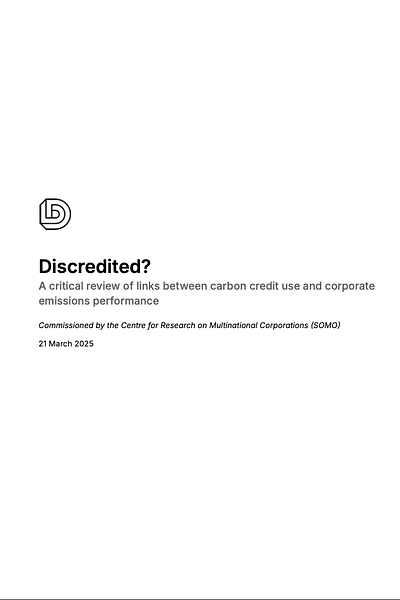Carbon credits: help or hindrance?
New briefing casts doubt on links between carbon credit use and corporate decarbonisation
When a company buys carbon credits, how does this affect its broader journey towards net zero emissions? It depends who you ask.
For years, climate-focussed campaigners have argued that the voluntary carbon market (VCM) serves as a distraction from the real operational emissions cuts that major polluters need to make. The classic example is Delta Air Lines, which in 2020 announced a ‘carbon neutrality’ plan based on buying millions of credits from nature conservation projects, before swiftly backtracking after researchers scrutinised their quality.
Recently, however, a different view has emerged. Two reports published by organisations with stakes in the long-term success of the VCM — Ecosystem Marketplace and MSCI Carbon Markets — purport to show a strong link between corporate use of carbon credits and real operational emissions reductions. According to these reports, based on analysis of data from the Carbon Disclosure Project (CDP), companies that use carbon credits actually decarbonise further and faster than those which do not. Both reports have received significant media coverage — but do they stand up to scrutiny?
Data Desk was commissioned to review these reports by The Centre for Research on Multinational Corporations (SOMO), and today we’re publishing the results:
Our work builds on on an excellent post from Carbon Market Watch, which shows several leaps of logic made by the reports’ authors but doesn’t analyse their methodologies in detail. Digging into the CDP data that sits behind both reports, we find:
a biased sample — disclosure of emissions figures to CDP is voluntary and rates of disclosure vary significantly by industry, region and other variables, leading to a fundamentally unrepresentative data set;
significant data quality issues — both in the reports themselves and in the underlying data, with divergent strategies for dealing with the latter raising questions about the integrity of the analyses;
conclusions that hold for the data as a whole, but fall down when applied to companies in the most polluting industries; and
insufficient attention to the role of mergers and acquisitions in companies’ reported emissions.
Having reviewed the reports thoroughly, we conclude that current corporate emissions data simply isn’t good enough to support the conclusions drawn.
At a critical moment for the future of the voluntary carbon market, with intensive lobbying underway, we hope this briefing encourages greater scrutiny of some of the bolder claims made in its defence, particularly when these come from organisations with ‘skin in the game’.
For more on this topic, check out SOMO’s ‘Facing the facts: carbon offsets unmasked’, a series of articles debunking the most frequently used corporate myths about carbon offsets.




